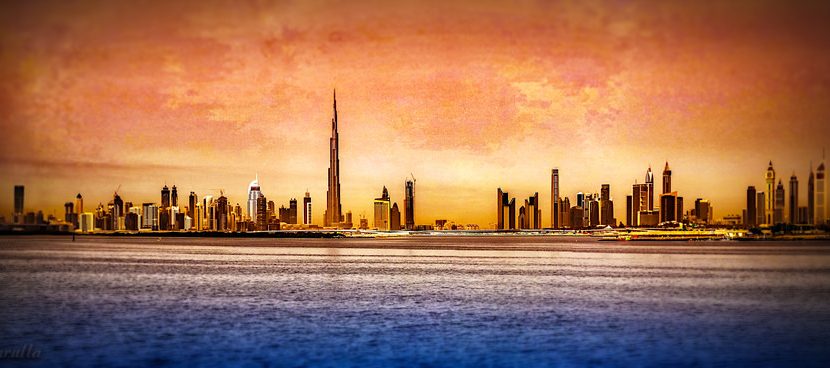Dubai reinforces its position in global economy
In-depth reviews that objectively and scientifically reflect the economic climate in Dubai in the report.
Dubai Economy has presented the Dubai Economic Report 2017 to all government entities and other agencies concerned following its approval by HH Sheikh Hamdan Bin Mohammed bin Rashid Al Maktoum, Crown Prince of Dubai.
The report, which includes information and in-depth reviews that objectively and scientifically reflect the economic climate in Dubai as well as the economic renaissance witnessed by Dubai and the UAE across various sectors, aims to help decision-making in the public and private sectors and contribute to economic growth in the emirate and the UAE in general.
The report shows that the vitality of Dubai’s economy is due to the strong foundations on which the government is based and the effective policies being adopted to stimulate diverse economic activities, especially in the tourism, air and sea transport and real estate sectors. It has also helped to strengthen Dubai’s openness and develop partnerships with many countries in the region and the world, attracting companies, investment and tourism from all over the world.
The Dubai Economic Report 2017 focuses on the characteristics and factors influencing growth in the emirate when compared to the global economy. The emirate’s economy is highly open in terms of trade, real estate purchase and foreign investment. Dubai’s foreign trade is highly sensitive to the changes in external demand as most of its partners are from neighbouring countries.
The report showed that the economy of Dubai in 2016 continued to perform well at the macro level with Dreal GDP growing at 2.9 per cent. Dubai was able to achieve growth rates that exceeded that of developed economies despite the decline in oil prices. Growth in 2016 was supported by growth in key economic sectors, such as manufacturing, transport and storage, real estate, finance and insurance, wholesale and retail trade and tourism.
Key economic sectors accounted for 77.2 per cent of Dubai’s gross domestic product of AED 376.8 billion, in constant prices, in 2016. All sectors excluding the construction sector achieved positive growth rates. The wholesale and retail trade sector, including the repair of automobiles, accounted for 27.5 per cent of GDP and 22.4 per cent of total employment and in spite of a slowdown in 2016 the sector is expected to spring back to rates close to the overall growth of the Dubai economy.
Dubai has paid great attention to developing transportation, storage, communications and information services, which together accounted for 16 per cent of GDP in 2016. Growth in the transport sector was 4.7 per cent and in the telecommunication sector, 3.6 per cent. Dubai has a high-quality transport infrastructure, with the UAE ranking first in the region and fourth in the world among 138 countries in the quality of transportation infrastructure.
The hospitality sector (5.1 per cent of GDP) had the highest growth–10.6 per cent in 2016, followed by the real estate sector at 6.5 per cent, transportation and storage at 4.7 per cent, manufacturing at 3.4 per cent, wholesale and storage, and financial activities at 5.1 per cent, and insurance at 1.3 per cent.
According to the MasterCard Global Destination Cities Index, Dubai has maintained its position as the world’s fourth largest tourism destination, after Bangkok, London and Paris, in 2016. The 2016 mobile subscription index of the World Bank ranked Dubai the first in the world, with 235.2 telephone lines per 100 inhabitants, and 23.1 internet lines per 100 inhabitants, which is higher than the GCC average.
The industry sector comprising manufacturing, mining, quarrying and electricity is a leading sector in Dubai’s economy. In 2016 the sector ranked fourth in Dubai’s economy after wholesale and retail trade, transport and storage, and financial services. Manufacturing contributed about 10 per cent of GDP in 2016 and recorded an increase in value added equivalent to 3.4 per cent compared to 2015. The Government of Dubai is adopting policies to help increase the contribution of the industrial sector to the same or higher than in emerging and developed countries. The Dubai Industrial Strategy 2030 launched by the Government of Dubai in 2016, seeks to restructure the local economy in line with developments in the global economy, especially with regard to access to sectors with high value-add and competitiveness.
The report shows that the prospects for the growth of Dubai’s economy in 2017 is promising. The emirate’s economy is expected to achieve a real growth of 3.2 per cent or higherr due to the continued recovery of the global economy in 2017 and improved growth rates in developed, emerging and developing economies. Strategic initiatives adopted by the government of Dubai during the past years to cover Islamic economy and innovation as well as the Smart City programme and hosting Expo 2020 in addition to the mega projects announced by the government aimed at diversification and sustainability, including major road and transport infrastructure projects estimated at AED 15 billion, will take Dubai past various milestones and other major economies regionally and globally.
Dubai’s remarkable successes in the economic field would not have been possible without the vision of HH Sheikh Mohammed bin Rashid Al Maktoum, Vice President and Prime Minister of the UAE and Ruler of Dubai, who aspires to improve the welfare of the community and enhance the emirate’s position on the global competitiveness map . This vision was translated into action by HHs Sheikh Hamdan, who mobilised resources and energies in the emirate towards transforming the goals set into clear work programmes for sustinable development acccording to the Dubai 2021.
All rights reserved to the initial publisher for Zawya.
Collected and published by Arms &McGregor International Realty® editorial team. Get in touched with us at [email protected]

